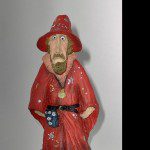
In my last article here, I reflected on the role that literature and fiction played on my spiritual development. Now, I turn my attention to mythology, and its potential uses and ramifications.
The action of Western culture has collapse mythology into the larger literary canon. However, unlike other literary works, mythology possesses a primarily spiritual character (in contrast to a focus on entertainment or pedagogy). The purpose, or intention, of those stories that we have come to describe as mythological is spiritual and often religious. Further, mythology, as we now possess it, stands a bit apart. “Myth operates by bringing a sacred (and hence essentially and paradoxically “timeless”) past to bear preemptively on the present and inferentially on the future (“as it was in the beginning, is now, and ever shall be”)” (Puhvel, 1989, p. 2). As Jaan Puhvel explains, mythology steps outside of time. Myth represents past, present, and future simultaneously. Indeed, it could be said that myth seeks to render the timelessness of spirituality into the present moment.
Indeed, the way that mythology leads us to conceive of time is of the greatest importance:
In the rectilinear time frame imposed on occidental cultures by the Judeo-Christian traditions, the entire world drama fits within a straight path between these two poles, as a dynamic, unique cosmos and anthropohistorical process from start to finish, marked off by static, latent “time without end” on both sides. This contrasts with the cyclical time concept and worldview of many oriental and classical cultures, where not only the world but mankind at large is periodically rejuvenated and regenerated… (Puhvel, 1989, p. 21)
Mythology helps us shift our attention from the everyday to the eternal. It can lead us to see differently our relations to the world around us. When we consider time in the mythological frame, it forces us to reexamine our place and our time. Indeed, the cyclic time of mythology shows us the possibility that the truth of these stories may still be with us. Indeed, it may never have really departed at all.
Mythology connects us with a great expanse of spiritual experience. To the modern reader, these is something a bit alien to mythology. It is always preserved against time. It comes to us from a lost place, a strange survivor full of strange stories. These stories carry the spiritual understanding of a people otherwise lost to us. Indeed, “A myth in its pristine state is by definition specific to a given human environment” (Puhvel, 1989, p. 2). Mythology presents to us a chance to apprehend something long gone, and for those of us who see their spiritual power, to perhaps recover some of that lost understanding into our present. Mythology does not simply show us Gods, it shows us an understanding, a way of being in the world. Mythology can provide us with an orientation.
Mythology sits somewhere between poetry and literature. It takes a series of interpretations, and its meaning shifts through the poetic and the literary and, perhaps, takes us somewhere else. Mythology seems to inspire a poetic instinct, and this instinct may lead us to somewhere quite unexpected.
Whatever we may think about the nature of poetic creativity, and no matter how demonstrable or probable it is that many individual poets wrote and continue to write poetry around myth, it should be quite clear that all of this poetry from individuals has as its basic premise the existence of the world of myth; and that this original myth cannot, in turn, be explained away by that which we call “the poetic process.” When Wilamowitz demands, and rightly so, that our first premise must be, “The gods are there,” then this means, if we examine it more precisely, “The myth is there.” For if the gods “are,” if they are real, then they cannot fail to have distinctive characteristics. With this, however, we are already in the world of myth. And who will dare to decide beforehand how great a measure of diversity and emotion can be ascribed to the forms of deity in their first manifestation? (Otto, 1965, p. 15-16)
When we allow mythology to function as mythology, it takes us through time to the world of mythology. When we approach mythology, it takes us into itself, and allows us to apprehend something quite different from what we are used to. Indeed, “Myth must be understood as myth, not as history or metaphor or any other substitute” (Puhvel, 1989, p. 12). I do believe that it is important for us to come to mythology on its own terms, if we really seek to understand it, rather than forcing our own particular desires upon it.
Of course, mythology is not entirely sacrosanct. Each of us will come away from mythology with our understandings, and each of us will deploy that mythology in a way that suits us. However, it is important for us to make the effort to allow mythology to speak first to us, before we drown out its unique voice with our own.
References:
Otto, W. F. (1965). Dionysus: Myth and cult. Bloomington, IN: Indiana University Press.
Puvel, J. (1989). Comparative mythology. Baltimore, MD: Johns Hopkins University Press.
Syncretic Electric is published on alternate Fridays. Subscribe via RSS or e-mail!

















